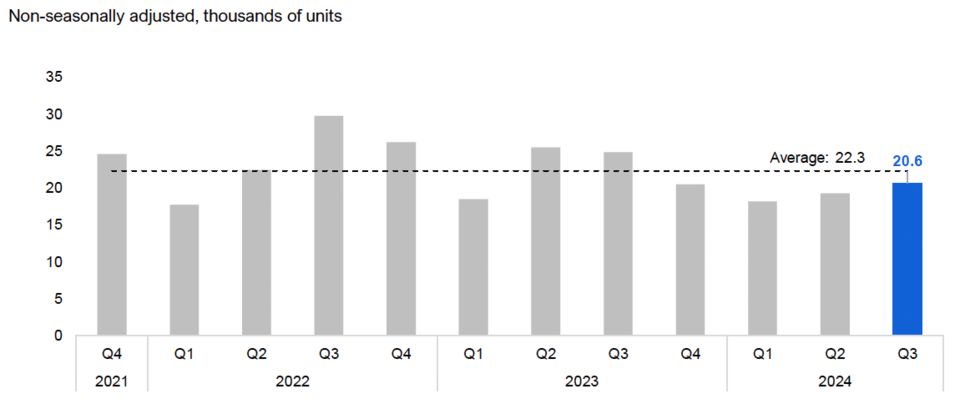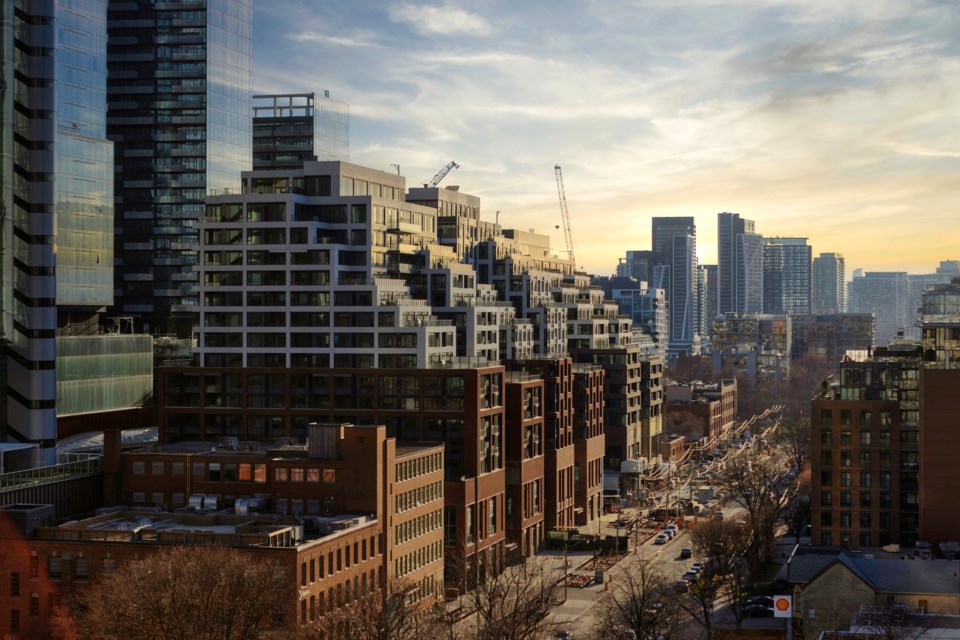The walls seem to be closing in on the Ford government's home-building plan.
Fresh off a disastrous housing projection in its latest fiscal statement, Ontario got more bad news on Thursday, courtesy of the province's arm's-length financial watchdog.
Housing starts in the latest quarter have declined compared to the same period last year by 16.9 per cent, the Financial Accountability Office (FAO) said in its latest economic monitor report.
For detached homes, Ontario "is on track for the lowest level of annual starts on record back to 1955," the report reads, noting that the share of detached units has declined over time due to "affordability challenges, changes in household preferences and planning efforts aimed at increasing density."
Ford has committed to building 1.5 million homes by 2031, a target that has only slipped further out of reach since it was announced. To hit that target, Ontario would have needed to start 34,100 homes per quarter on average, beginning in 2021.
Over the past three years, the province has averaged 22,900 starts per quarter — just two-thirds of its goal, the FAO found. The previous quarter saw 20,600 units started.
Hitting the 1.5-million target now would require the province to beat its 2021 building pace by 74 per cent and hit record highs every quarter from now until 2031.
That won't happen unless the Ford government takes some drastic measures, experts say.
"I think it's theoretically possible if the province put in substantial reforms, but it doesn't seem that they have any appetite to," Mike Moffatt, founding director of the Place Centre at the Smart Prosperity Institute, said.

Ontario isn't building enough homes — but it's also not building the right types, Moffatt said. Developers are incentivized to build tiny condo units and so-called McMansions to recoup costs because it's too expensive to build the "missing middle" — dense, low-to-mid-rise housing and townhomes where people can comfortably raise families, he said.
Over the years, provincial governments have downloaded costs onto cities, which have responded by cranking up development charges on builders — one of the few revenue tools available to them, Moffatt said. In turn, developers are complaining that they can't afford to build.
"If you want to build a home in Vaughan, Ontario, just the development charge on that is more than I paid for my entire house 20 years ago," Moffatt said.
"I think the province needs to step up with more infrastructure money," he said, adding that the Building Faster Fund is a good start.
"But I think as well, there needs to be more restrictions on municipalities. Over the last 20 years, municipalities have raised their development charges by 1,000 per cent or more. We cannot continue on that trajectory," he said.
The lack of housing starts rests on the Ford government's "sprawl and highways legislative agenda," Phil Pothen of Environmental Defence said.
A recent Environmental Defence report calls on the province to allow as-of-right construction of mid-rise apartments, prohibit municipalities from mandating onsite parking, provide permanent funding for mid-rise apartment development, legalize six-storey "single egress" buildings, and require lower development charges on such projects.
"This isn't new information. This is what we have been telling the provincial government time and time again for years now," Pothen said.
On development charges, Ontario could up-zone single-family neighbourhoods to allow six-storey buildings, and then take over the cost of infrastructure funded by those fees — like sewers, parks, roads and libraries, Pothen suggested.
Premier Doug Ford has personally ruled out allowing even four-storey buildings as-of-right across the province.
Green Leader Mike Schreiner said the Ford government "has no idea how to get homes built."
"Every time the premier has a chance to course correct, he chooses to side with insider interests and NIMBYism. Ontarians have had enough," he said in a statement responding to the FAO report.
The NDP has proposed a new agency — Homes Ontario — to finance and oversee the construction of affordable and non-market homes. The government shot that down.
NDP finance critic Catherine Fife said the government isn't getting it done.
"If Ford can't build affordable housing[,] it's time he got out of the way for an NDP government that’ll get Ontario back to building," she said in a statement.
Housing Minister Paul Calandra's office did not comment by publication time.
Construction job losses, inflation and low sales
For much of its time in office, the Ford government has touted itself as a champion of home-building. Recently, however, its sought to downplay the issue as data shows housing starts declining.
The province's fall economic statement, tabled in late October, projected housing starts to decline for the second consecutive year in 2024, followed by slight increases from 2025 to 2027 that would still fall well short of the government’s annual targets.
Calandra has said the government "will not fail" on its 1.5-million-homes goal.
The government’s ongoing actions to help municipalities build housing-enabling infrastructure — like water and wastewater facilities — will help, as will lower interest rates, the housing minister said.
The Bank of Canada has lowered its rate from 5 per cent to 3.75 per cent this year, the FAO noted.
High interest rates have meant lower-value loans for builders and would-be buyers scared off by mortgage rates. Home resales have cooled significantly — 40,900 last quarter, down from 68,400 on average from 2020 to 2022.
Home resale prices were up 0.6 per cent in Q3 to a provincewide average of $864,800. That's down from the 2022 peak of just over $1 million.
Weak home-building has also resulted in 14,200 construction job losses in Q3, the FAO noted. The industry has reached its lowest share of total employment since mid-2015.
The FAO also found shelter costs like mortgages, insurance, rent and hydro drove 70 per cent of Ontario's 2.3 per cent consumer price inflation increase in Q3.
Ford has come under more scrutiny lately as Global News reported that the government still hasn't defined "attainable housing" despite committing to the program years ago.
Ontario is still "identifying potential program levers and completing site-specific business cases," The Trillium reported this summer, based on government documents.




